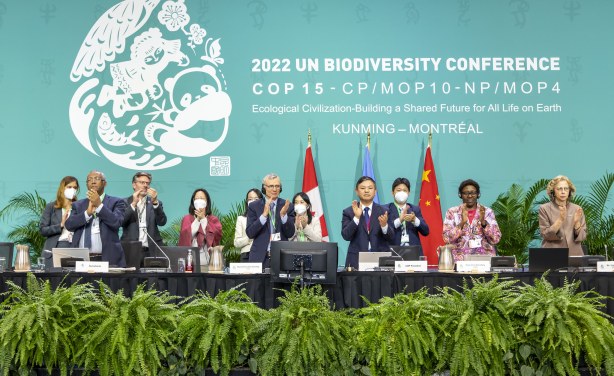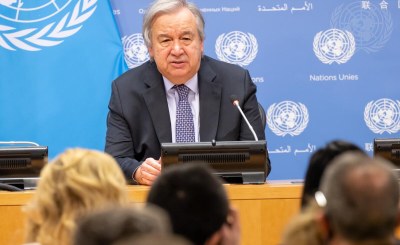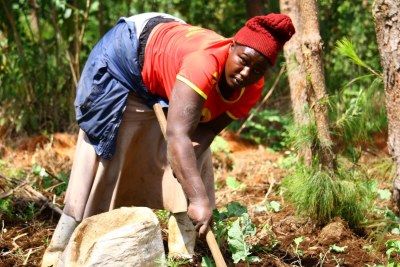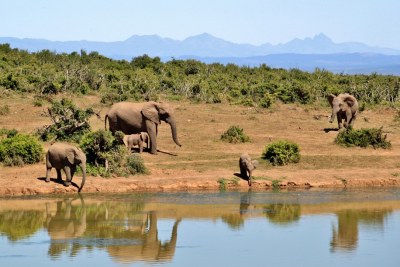-
Rwanda: Rwanda Welcomes Global Deal to Save Species From Extinction
New Times, 20 December 2022
Rwanda has welcomed the adoption of a historic agreement to address the loss of biodiversity and restore natural ecosystems. Read more »
-
Africa: UN Conference Concludes With 'Historic' Deal to Protect a Third of the World's Biodiversity
UN News, 19 December 2022
The UN Biodiversity Conference, COP15, concluded early on Monday in Montreal, Canada, with a landmark agreement to protect 30 per cent of the planet’s lands, coastal areas… Read more »
-
Africa: Digital Treatment of Genetic Resources Shakes Up COP15
IPS, 16 December 2022
In addition to its nutritional properties, quinoa, an ancestral grain from the Andes, also has cosmetic uses, as stated by the resource use and benefit-sharing permit… Read more »
-
Africa: COP15 - Biodiversity Conference 'Fails' to Protect Indigenous People's Rights
AI London, 19 December 2022
COP15 aims to preserve biodiversity by calling on countries to commit to declaring 30% of the earth protected for conservation by 2030 Yet '30 x 30 agreement' falls short of… Read more »
-
Africa: COP15 - Countries Reach Agreement to Protect Land, Water Resources
Premium Times, 19 December 2022
COP15 is expected to lead to the adoption of a new Global Biodiversity Framework, guiding actions worldwide through 2030, to preserve and protect our natural resources. Read more »
-
Africa: Gender Target At COP15 - Russia's Single Word Objection Holds Up Process
IPS, 19 December 2022
Since the beginning of the high-level segment, tensions have been steadily rising at the 15th meeting of the conference of the parties to the UN Convention on Biological Diversity… Read more »
-
Africa: Guterres Announces 'No Nonsense' Climate Action Summit for September 2023
UN News, 19 December 2022
The UN chief said on Monday he was determined to make 2023 "a year for peace" and a "year for action", highlighting the need for practical solutions to a raft of pressing problems… Read more »
COP15 Ends With Landmark Biodiversity Agreement
The United Nations Biodiversity Conference (COP15) ended in Montreal, Canada on December 19, 2022 with a landmark agreement to guide global action on nature through to 2030. Representatives from 188 governments have been gathered in Montreal for the past two weeks for the important summit.
Negotiators also agreed to manage the remaining 70% of the planet to prevent losing areas of high importance to biodiversity and to ensure that big businesses disclose biodiversity risks and impacts from their operations.
During COP10, governments agreed to strive for ambitious targets by 2020, including halving natural habitat loss and implementing plans for sustainable consumption and production. But none of these targets were fully met, according to a 2020 UN report.
However, nations at COP15 fell short of explicitly recognising Indigenous peoples' lands and territories as a separate category of conserved area, which ultimately threatens their rights. Amnesty reports that despite safeguards in the document, a number of Indigenous peoples remain opposed to calls to expand protected areas, given the appalling abuses that are committed in such areas in many countries.
InFocus
-
Agroecology supports the soil, and biodiversity which is important for resilience. It allows farmers to adapt to climate change, and sustainably use and conserve natural ... Read more »
-
Biodiversity is a term used to describe the enormous variety of life on Earth. It can refer to all of the species in one region or ecosystem and includes every living thing - ... Read more »

Delegates applaud the adoption of the Kunming-Montreal Global Biodiversity Framework on December 19, 2022.




